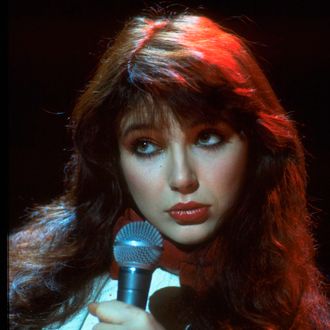
Waiting to hear Kate Bush’s voice for the first time in six years feels like bracing for an earthquake. You’ve heard the currently chart-topping “Running Up That Hill” by now, so you know what I’m talking about. The song’s bone-shaking instrumentation, its polymorphous perversity, its primeval genius — you feel its creator must have the power to shift tectonic plates.
Instead, Kate Bush picked up the phone to Radio BBC Four’s Emma Barnett with characteristic meekness. Her voice a soft lilt that makes you feel loved and protected, like a mother, or a bomb shelter. Your muscles immediately seem to relax upon hearing it.
“Well it’s just extraordinary,” she told the Woman’s Hour presenter when asked about her recent brush with virality. “The whole world’s gone mad!”
The pre-recorded conversation was Kate Bush’s first broadcast interview in six years, in celebration of the cult British singer’s recent unprecedented chart success. Last week, her 1985 hit “Running Up That Hill” became the world’s most streamed song, reaching number one on the U.K. charts and earning the singer her first top-ten entry on the U.S. charts — beating out the likes of Harry Styles and Bad Bunny. It’s all thanks to the song’s pivotal role in season four of Netflix’s Stranger Things. Max, one of the show’s leads played by Sadie Sink, is seized by a monster who preys on humans with emotional trauma. Her friends soon learn that they can save Max by playing her favorite song, “Running Up That Hill.” For many long-term Bush fans, the metaphor feels terribly close to home.
Now, a new generation has discovered Bush. “In a lot of cases they’ve never heard of me … these young people … I think it’s very special,” Bush said.
The singer also revealed that she’d been a fan of Stranger Things since its first episode. “We binge-watched the series together,” she responded when asked about her son, Bertie, who performed alongside his mother on her 2014 tour.
Barnett also asked her about the original meaning of “Running Up That Hill.” “The idea was a man and a woman swapping places with each other to see what it was like from the other side,” she responded. Ultimately, she said: “I really like people to hear a song and take from it what they want.”
This falls into line with Bush’s usual approach to promotion: just let the work speak for itself. “I kind of adopted a philosophy a long time ago that I wanted my work to speak for me,” she told the Sydney Morning Herald in 2011. Similarly, in a 1985 interview with Music Box she explained that she’d rather promote her work than her private life. “It can be daunting going from such a private existence to such a public one,” she said.
When asked a somewhat curveball question, about the youth’s engagement with Bush and their recent TikTok-ification of the singer — “do you know about ‘Witchtok’?” — Bush responded with that winning graciousness. “No, I don’t, it sounds ridiculous,” she said, brushing off the question with a laugh.
Bush’s last interview took place in 2016, coinciding with the release of her Before the Dawn live album, and it received less of a laugh. She spoke with the Canadian magazine Maclean’s and reported as voicing support for former Conservative prime minister Theresa May. In 2018, to coincide with the release of two remastered projects, Bush wrote on her website: “I didn’t do any interviews for either project hoping that the work could speak for itself.” Then, referring to the Maclean’s article, she said she was “very disappointed that the use of a quote out of context was timed with the release of the live album and it seemed as if the focus went onto the quote rather than the work.”
In the years since, Bush fans have typically only heard from the singer once a year, in December, when she tends to send out laconic yet well-wishing season’s greetings on her website. “Wishing you all a wonderful Christmas and a fantastic 2018,” she wrote in 2018. “Thank you as always, for your support. It means such a lot. Very best wishes, Kate.”
Now, in the past month alone, Bush has written on her website four times, expressing gratitude. To fans, she’s never felt closer.
It’s strange that perhaps the only reason we’re hearing Bush’s voice again is because of a few timely, yet arbitrary, factors: Stranger Things, TikTok, meme culture. Is it a crude decontextualization of Bush’s legacy? Is it a cheap way to engage with some of the most radical and gorgeously openhearted and ludicrous pop music ever created? It doesn’t matter either way. “Incredible things are happening,” said Bush. Even if we have all gone mad, “there are positive things, you just have to look a bit harder to find them.”

